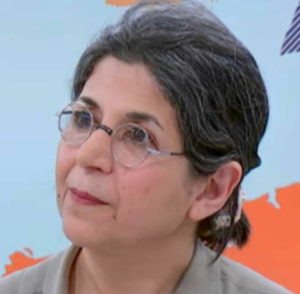February 18, 2022

Aras Amiri, an Iranian legal resident of Britain, has been acquitted of spying charges and allowed to return home to London after four years in prison.
She was flown out of Iran immediately after the Iranian Supreme Court overturned her conviction for espionage, her lawyer announced and her employer, the British Council, confirmed.
She was arrested in March 2018 while visiting her family and sentenced to 10 years for espionage. That has become the standard sentence for dual nationals who are accused of spying but not really believed to be spies. Real spies are executed.
She was held in Evin prison, but furloughed for a while last year because of the coronavirus epidemic. She was then furloughed again the last few months, probably because those whose cases are being heard on appeal are supposed to be able to go free.
Her release came as a surprise since she worked for a British government agency whose very existence infuriates the Islamic Republic. The British Council said, “She worked in our London office as an arts program officer supporting greater understanding and appreciation of Iranian culture in the UK.”

The British Council was outlawed by Iran in 2019, long after Amiri was arrested. Iranians were warned then that any cooperation with the agency could lead to prosecution.
The Iranian prosecutors said Amiri had used her contacts with arts and theater groups to “influence and infiltrate” Iran at the cultural level.
Iran’s Judiciary claimed Amiri had confessed to working with British intelligence. But in an appeal letter to Iran’s chief justice, Amiri said she had been jailed for refusing to go along with Iranian intelligence forces who asked her to spy for them.
“I directly rejected their request for cooperation and told them that I can only work in my own field and nothing else,” she wrote from prison in June 2019.
Amiri’s release leaves at least three Anglo-Iranian dual citizens detained in Iran Nazanin Zaghari-Ratcliffe, who worked for the charitable arm of the Thomson-Reuters organization; Murad Tahbaz, an environmentalist; and Anoosheh Ashoori, a retired engineer.
The same day Iran’s Supreme Court freed Amiri, the prison system ordered French-Iranian dual national Fariba Adelkhah, 62, to return to prison, ending her furlough. She is serving a five-year term for “conspiring against national security” and a one-year term for “propaganda against the state.”
The Judiciary said Adelkhah had broken the conditions of her furlough “dozens of times,” but it did not say how she broke the rules. She had been released with an ankle bracelet and may have traveled further from her home than the rules allowed.
The government of France including French President Emmanuel Macron personally complained angrily about Iran’s re-incarceration of Adelkhah. Iran responded even more angrily, saying it does not recognize dual nationality and France’s comments amounted to “interference by other countries in the judicial process” of Iran.
Then, on January 25, another court convicted Benjamin Briere, 36, a French national who was driving across Asia. He was convicted of espionage, cooperating with hostile states and propaganda against the Islamic system for flying a small drone while he stopped near the Turkmenistan border. He was sentenced to eight years and eight months. France called that “unacceptable.”
Iran’s Judiciary has issued no statement about Amiri’s case yet. Her lawyer, Hojjat Kermani, said the Supreme Court determined that her conviction had gone “against Sharia law.”
Many Western groups accuse the Islamic Republic of arresting dual nationals to use them as bargaining chips with the West. And, indeed, many such prisoners have been swapped for Iranian nationals arrested in the West, usually for violating sanctions. However, in the case of Amiri, there is no sign that she was released in exchange for anything.
Richard Ratcliffe, the husband of Nazanin Zaghari-Ratcliffe, has said he believes his wife is being held to force Britain to repay funds Iran paid Britain a half-century ago for tanks that were not delivered after the revolution. However, British diplomats say Iran has never linked the tanks and Nazanin’s detention.
Ratcliffe says his wife is feeling more hopeful after the release of Amiri.
“She got a phone call from [British Foreign Secretary] Liz Truss on her birthday on Boxing Day [December 26] which was nice for her. Liz said: ‘You are a priority, we are working on things’,” Ratcliffe said.
“Nazanin is probably a bit angry about still being stuck there, but she is more positive than I am. I fundamentally am quite bleak at this point. She sees Aras’s release as good news at face value and her coming out as a good thing.
“She was really flat before Christmas. But I can’t quite read this game of cat and mouse. There are reasons to be hopeful. I think we need to campaign for a while to come, but Nazanin is trying not to think about that.”
“For Nazanin, it is a bit bittersweet. Whenever anyone gets out, it is a reminder she is still there. Of course, there isn’t a queue in hostage cases, but whenever you see someone else get out who was arrested after you, you are wondering why it isn’t you.”
At least 16 Iranian-born men and women who are citizens or permanent residents of Western countries are known to be detained in Iran. There are five from the US, three from the UK, two each from France, Sweden and Austria, and one each from Canada and Germany.






















